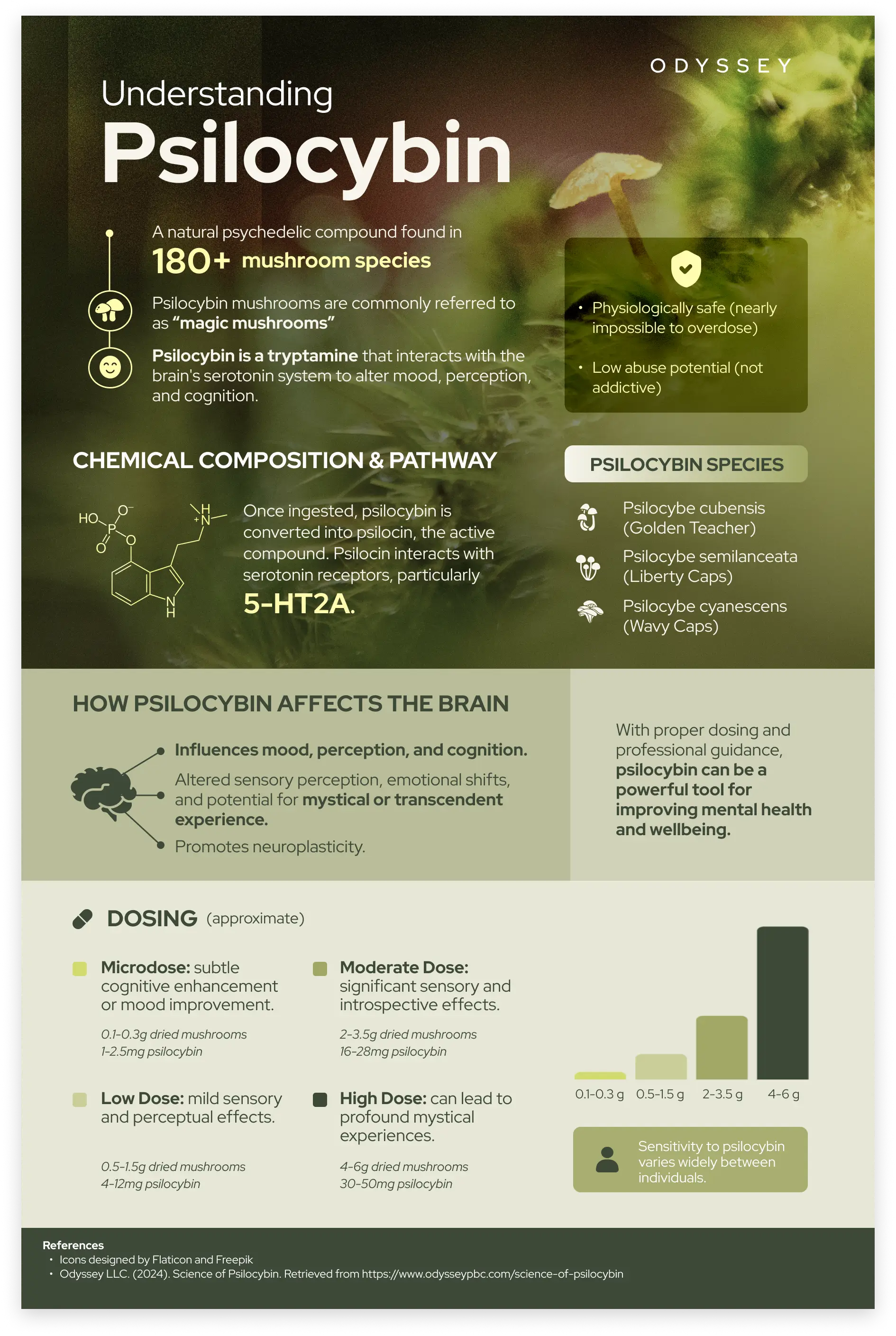Finding Legal Psilocybin Therapy in Colorado

Until recently, the national sentiment around psychedelics has been lukewarm at best. But last year, the U.S. Food and Drug Administration boldly broke tradition with the Federal Government’s historically hardline approach to controlled substances. In June 2023, they published comprehensive guidance on the use of psychedelics in clinical settings, paving the way for a new national frontier in mental health treatment.
Psilocybin-assisted therapy is an increasingly proven, science-backed approach that represents a viable supplement to traditional mental health counseling. Studies conducted at reputable institutions like Johns Hopkins University have found that psilocybin is safe, effective, and can produce long-lasting benefits for patients suffering from varying degrees of depression, obsessive-compulsive disorder (OCD), anxiety, life transition stress, and more.

As the medical research becomes clearer, so too does the call for action from advocates. Distinguished voices like that of American Journalist Michael Pollan have done much to popularize the science and potential therapeutic applications of psychedelics. In Pollan’s New York Times Best-Selling book, How to Change Your Mind, he presents a layperson’s take on the research, alongside personal anecdotes that have resonated with readers the world over and driven them to support expanded local and state psilocybin policies.
The increasing, mainstream demand for psychedelic treatment has stirred legislatures to consider the issue more closely, with some states making significant headway toward legalizing psilocybin-assisted therapy for their patient populations. Colorado is one such state where policymakers have made inroads, and this article will explore how interested residents can maintain compliance with current laws, prepare for changes, and pursue this life-changing treatment for themselves.
Is Psilocybin Legal in Colorado (in 2025)?
In 2022, Colorado became the second state to decriminalize active compounds found in certain psychedelics, following Oregon’s example two years prior. The new rules made it legal for residents over the age of 21 to grow, possess, gift, and use psilocybin without the fear of arrest or prosecution. There are no quantity limits, but residents are prohibited from public consumption and restricted to private use in their homes or at a healthcare facility. Even in clinical settings, sales above 14 grams will remain illegal, and growing is restricted to 12-by-12 foot enclosures.
Colorado’s psilocybin therapy law, known as the Natural Medicine Health Act (NMHA) of 2022—or more colloquially, Proposition 122—tasks the Natural Medicine Advisory Board with generating a plan for supervised use in clinical settings. The licensure program affiliated with the NMHA is set to take effect on September 30, 2024, at which point healthcare providers will be eligible to file applications with the state and request authorization to render psychedelic-assisted treatment to patients.
While personal possession and use are entirely legal under the NMHA, the parameters around distribution are far less clear. Treatment centers hoping to get an early edge in the market may only administer psilocybin for the express purposes of harm reduction or support. Additionally, distributors cannot advertise, which poses its own challenges for sustained revenue models. The law also does not permit sales through dispensaries.
The lack of specificity around distribution has led to what some are calling a ‘gray market,’ where professional mental health professionals use the statute’s gifting loophole to provide clients with psilocybin and then simply charge for services. Once the NMHA’s final provisions go live in September, therapists and other licensed professionals will be able to bill for the drug alongside any facilitated use they administer to their patients.
In summary, Colorado is poised for a transformative year in 2025 regarding psilocybin legislation, with ongoing legislative efforts and preparations for regulated therapeutic use taking center stage.
How Do Laws on Psilocybin Use in Colorado and Oregon Differ?
Both Colorado and Oregon are trailblazers in the field of psychedelic therapy. Their respective laws represent much-needed progress toward a wider selection of treatment options for patients struggling with mental health. However, each state has important distinctions in their regulations that impose vastly different requirements for those individuals interested in pursuing psilocybin-assisted therapy.
Oregon’s law, commonly referred to as Measure 109, is predominately programmatic in nature. It calls upon the Oregon Health Authority (OHA) to establish governance around the licensure and facilitation of monitored psilocybin use. The OHA was initially given two years to fully implement the program, as well as define licensure requirements, dosage standards, and packaging rules. Measure 109 also allowed localities the option to bar psilocybin manufacturers and service centers from certain areas and outright restricted them from incorporated cities altogether.
Colorado’s law is comparable to Oregon’s, but with a few important caveats. In some ways, the NMHA gives greater freedoms to its state’s residents through legal personal consumption, growth, and dispensation. Oregon’s Measure 109 does not provide the same allowances and explicitly details that psilocybin consumption may only occur in a facilitated setting. Residents are prohibited from growing, owning, or distributing psychedelics.
Colorado’s timeline is also far more aggressive. Whereas Oregon was able to roll out their program over the span of two years, Colorado is pushing its Natural Medicine Advisory Board to meet much more expeditious deadlines; the NMHA was passed in 2022, signed into law in summer 2023, and is expected to reach full implementation by the end of 2024.
Finally, the details of the two states' laws differ drastically. Oregon’s law focuses strictly on psychedelic fungi, specifically psilocybin. On the other hand, Colorado’s NMHA is broader in its approach, decriminalizing five, specific substances, including dimethyltryptamine, or ‘DMT.’ Colorado’s facilitated treatment provision remains limited to psilocybin, however.
Odyssey is currently operating in Oregon with service center partners in Portland, Bend, and Ashland with plans to partner with similar evidence-first facilitators in Colorado upon its full implementation.

What is Psilocybin-Assisted Therapy?
Psilocybin-assisted therapy is a treatment pathway to help patients overcome mental struggles, most notably depression and OCD. It is safe, controlled, and led by qualified professionals.
Odyssey leverages the science of psilocybin to provide guided sessions for those in need. In line with accepted practices, Odyssey requires a thorough screening process to address participant concerns and ensure the treatment is a good fit. Upon successfully completing their screening, clients are provided resources and information on how to best prepare themselves in advance of a session. During session administration, facilitators focus heavily on helping participants free themselves from inhibition and rigid belief structures through calming aesthetics and a comfortable environment.
Evidence seems to suggest the benefits may be a result of psilocybin's effects on the serotonin system, changes in brain network activity and connectivity, increases in neuroplasticity, and the therapeutic value of subjective effects from the psychedelic experience.
While psilocybin-assisted therapy has a reputation for its efficacy in treating depression and OCD, it has also been shown to help patients better manage anxiety, grief, and life transitions. A session facilitator will consider the participant’s needs and arrange the therapy’s structure in a way that best addresses the mental health area of concern.
The Importance of a Psilocybin Facilitator
Session facilitators are an integral part of psilocybin-assisted therapy. They promote a safe experience for participants and ensure an optimal set and setting.
‘Set’ refers to a participant’s frame of mind before and during a session. The facilitator’s role is to prepare participants during the intake and screening process, as well as provide non-directive support through the session itself.
‘Setting’ is the physical space in which a session takes place. A facilitator is responsible for creating a calm, aesthetically pleasing environment for participants that is safe, quiet, and distraction-free. Set and setting together can strongly shape the experience, and facilitators are trained to optimize both factors for the best chances at success.
A psychedelic experience is likely to be vivid and profound and may include working through challenging psychological and emotional material. This may mean working with uncomfortable and difficult sensations. It can be a natural instinct to "resist" such sensations in a way that increases the intensity. This can lead to a feedback loop of increased unpleasantness, and this often is what people describe as a "bad trip".
A trained facilitator that you trust can support you through challenging experiences. They serve as a grounded anchor, allowing you to relax into your experience and gain further insight. With a trusted, competent facilitator present, participants can rest assured that their experience, even if intense, is more likely to bear positive, healing results that improve their mental welfare over time.
Physiologically, psilocybin is non-toxic. There are of people for whom psilocybin may have increased risk, which we discuss in our safety article. Odyssey's intake process checks for risk factors to help us both make the best decision together. Participants can further enhance their own safety by being forthcoming about their medical histories, prescriptions, and health concerns during the intake process.

What to Expect from a Psilocybin Facilitator
Facilitators assist participants with everything from intake to aftercare. Every new client begins with an exploratory call that focuses on background, goals, and more. From there, facilitators walk interested participants through several screening steps.
Following their introductory conversation, participants must undergo a health screening to evaluate their medical background for any areas of concern. Certain chronic conditions and prescription medications can increase risk and jeopardize safety. Facilitators will communicate any concerns to participants during their evaluation.
Assuming the health screening comes back clear, a facilitator will conclude intake with a fit call. This is another opportunity to confirm the participant’s interest and address any outstanding concerns before booking appointment logistics.
During the session, a facilitator will administer psilocybin. Participants will have completed any preparatory work ahead of time. Sessions are traditionally day-long experiences full of reflection and mental exploration. Facilitators will help participants navigate the hours constructively.
Individuals interested in psilocybin-assisted treatment should approach the entire process much like they would conventional therapy, starting with a search for the best fit. Facilitators are trained to gauge their expertise for alignment with the participant’s healthcare goals, but it’s up to the client to make a final call on compatibility and comfort level. The better the synergy, the better the outcomes.
Where Can I Access Legal Psilocybin Services Today?
As of March 2025, Oregon is the only state with active, legal provisions for guided psychedelic treatment. Odyssey has been hard at work rendering psilocybin-assisted therapy through both private, guided sessions and organized retreats, led by high-quality facilitators with proven expertise.
Coloradans looking to arrange a session earlier than mid-2025 should visit our website to learn more about out-of-state treatment and travel considerations.
The team at Odyssey believes in the healing power of psilocybin-assisted therapy and eagerly looks forward to a future where every American can obtain the support they need without restriction or penalty. Odyssey hosts sessions at centers in Oregon across Bend, Ashland, and Portland. Interested participants can get started on their journey today by clicking here.

.svg)









.svg)